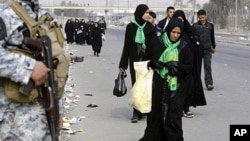Iraqi officials say that a motorcycle bomb blast has killed at least 20 Shi'ite pilgrims near the holy city of Karbala. The explosion came as hundreds of thousands of Shi'ite pilgrims made their way, mostly on foot, to Karbala to commemorate the 40th day after the historic slaying of Imam Hussein, grandson of the Prophet Mohammed.
The apparently sectarian attack targeted Shi'ite pilgrims on one of the more sacred days of the year, as hundreds of thousands marched on foot to Karbala, in Iraq's Shi'ite heartland. The blast tore into a thick crowd of pilgrims, killing and wounding dozens.
Ceremonies to mark the fortieth day after the slaying of Imam Hussein were outlawed under the regime of ousted Iraqi leader Saddam Hussein. Many Sunni Arabs dislike the event because they feel Shi'ites blame them for Hussein's death.
Iraqi TV showed images of damaged store fronts, broken glass, and metal punctured by shrapnel from the blast. It also showed images of wounded pilgrims wrapped in gauze bandages at the Hussein hospital in Karbala.
Two other explosions also targeted Shi'ite pilgrims in Baghdad Wednesday, causing even more casualties. A man living close to one of the explosions says that there would have been more casualties if the blast had occurred later in the day.
He pointed to the site of the explosion and indicated that it occurred while people were asleep, and that people rushed to see what happened after they heard the sound of the blast. He adds that stores were closed at the time [or more people would have been hurt].
A female suicide bomber blew herself up amidst a throng of Shi'ite pilgrims Monday, killing at least 41 people and wounding over 100.
Professor Hilal Khashan of the American University of Beirut thinks that sectarian violence between Sunnis and Shi'ites is on the rise, again, both in Iraq and elsewhere in the region. He says that the attempt to disqualify many Sunni candidates in Iraq's March parliamentary election is one cause, among many, for the upsurge in violence.
"It has a lot to do with the forthcoming elections," he said. "For the past week, Shi'ite pilgrims in Karbala have specifically been targeted, which worries us about the return of the cycle of sectarian bloodshed in Iraq. For some time, the intensity of sectarian conflict subsided, but now it seems that it is on the rise again. We have been witnessing al-Qaida mobilization against Shi'ites. In the past month there were attacks on the Iranian Revolutionary Guard Corps in Baluchistan. So, this surge that I see is not only limited to Iraq, but a regional phenomenon."
Prime Minister Nouri al Maliki blamed Monday's suicide bombing on both al- Qaida and the deposed Baath Party. "We hold Takfiris and Baathists responsible for the massacre," he said.
Iraqi TV reported that over 30,000 security forces were mobilized to prevent further attacks during the Shi'ite pilgrimage. Tens of thousands of people carrying colored flags and banners could be seen marching barefooted to Karbala on an overcast winter day.
Suicide Bomber Kills Shi'ite Pilgrims Near Iraqi Holy City of Karbala




